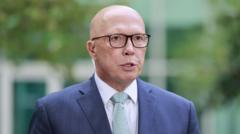In a surprising turn of events, Australia’s opposition leader Peter Dutton has reversed his decision to end work-from-home options for public servants, acknowledging the backlash and criticism from various sectors.
Australia's Opposition Leader Reverses Course on Work-from-Home Policy

Australia's Opposition Leader Reverses Course on Work-from-Home Policy
Peter Dutton apologizes after backlash against ending remote work for public servants
The Coalition's stance against remote work was initially part of their election campaign, but amidst strong opposition and allegations of bias against women in the workforce, Dutton conceded it was a misstep. During a press conference, he stated, "We got it wrong and we have apologised for it," addressing the public discontent as they head towards the election on May 3rd.
Criticism had intensified as the Labor government countered the Coalition's message, framing the policy as detrimental to women and other employees who relied on flexible working conditions. The Coalition has since clarified it would not pursue changes to current remote work policies, with Shadow Finance Minister Jane Hume emphasizing that flexible work arrangements enhance productivity.
Amidst these changes, questions have arisen over their proposed cuts of 41,000 public service jobs aimed at funding various initiatives, with some party members suggesting forced redundancies might occur. However, Hume reassured that job reductions would occur over five years through hired freezes and natural attrition, refuting any claims of forced job eliminations.
The political climate has been accentuated by broader global trends where leaders worldwide are advocating for a return to in-office work, such as US President Donald Trump’s executive orders. However, Australians appear more preoccupied with cost-of-living issues, as polls indicate these concerns take priority over work environment preferences. Dutton’s recent about-face showcases the delicate balancing act political leaders must navigate in today’s dynamically shifting workforce landscape.
Criticism had intensified as the Labor government countered the Coalition's message, framing the policy as detrimental to women and other employees who relied on flexible working conditions. The Coalition has since clarified it would not pursue changes to current remote work policies, with Shadow Finance Minister Jane Hume emphasizing that flexible work arrangements enhance productivity.
Amidst these changes, questions have arisen over their proposed cuts of 41,000 public service jobs aimed at funding various initiatives, with some party members suggesting forced redundancies might occur. However, Hume reassured that job reductions would occur over five years through hired freezes and natural attrition, refuting any claims of forced job eliminations.
The political climate has been accentuated by broader global trends where leaders worldwide are advocating for a return to in-office work, such as US President Donald Trump’s executive orders. However, Australians appear more preoccupied with cost-of-living issues, as polls indicate these concerns take priority over work environment preferences. Dutton’s recent about-face showcases the delicate balancing act political leaders must navigate in today’s dynamically shifting workforce landscape.



















